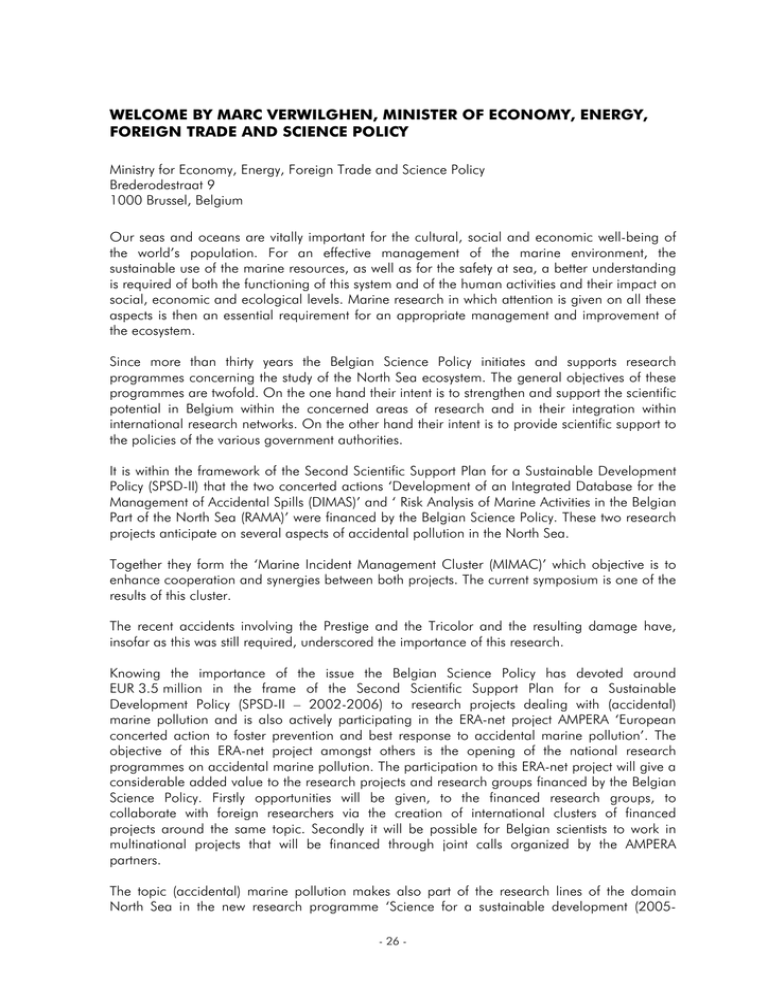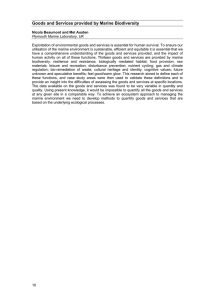WELCOME BY MARC VERWILGHEN, MINISTER OF ECONOMY, ENERGY,
advertisement

WELCOME BY MARC VERWILGHEN, MINISTER OF ECONOMY, ENERGY, FOREIGN TRADE AND SCIENCE POLICY Ministry for Economy, Energy, Foreign Trade and Science Policy Brederodestraat 9 1000 Brussel, Belgium Our seas and oceans are vitally important for the cultural, social and economic well-being of the world’s population. For an effective management of the marine environment, the sustainable use of the marine resources, as well as for the safety at sea, a better understanding is required of both the functioning of this system and of the human activities and their impact on social, economic and ecological levels. Marine research in which attention is given on all these aspects is then an essential requirement for an appropriate management and improvement of the ecosystem. Since more than thirty years the Belgian Science Policy initiates and supports research programmes concerning the study of the North Sea ecosystem. The general objectives of these programmes are twofold. On the one hand their intent is to strengthen and support the scientific potential in Belgium within the concerned areas of research and in their integration within international research networks. On the other hand their intent is to provide scientific support to the policies of the various government authorities. It is within the framework of the Second Scientific Support Plan for a Sustainable Development Policy (SPSD-II) that the two concerted actions ‘Development of an Integrated Database for the Management of Accidental Spills (DIMAS)’ and ‘ Risk Analysis of Marine Activities in the Belgian Part of the North Sea (RAMA)’ were financed by the Belgian Science Policy. These two research projects anticipate on several aspects of accidental pollution in the North Sea. Together they form the ‘Marine Incident Management Cluster (MIMAC)’ which objective is to enhance cooperation and synergies between both projects. The current symposium is one of the results of this cluster. The recent accidents involving the Prestige and the Tricolor and the resulting damage have, insofar as this was still required, underscored the importance of this research. Knowing the importance of the issue the Belgian Science Policy has devoted around EUR 3.5 million in the frame of the Second Scientific Support Plan for a Sustainable Development Policy (SPSD-II – 2002-2006) to research projects dealing with (accidental) marine pollution and is also actively participating in the ERA-net project AMPERA ‘European concerted action to foster prevention and best response to accidental marine pollution’. The objective of this ERA-net project amongst others is the opening of the national research programmes on accidental marine pollution. The participation to this ERA-net project will give a considerable added value to the research projects and research groups financed by the Belgian Science Policy. Firstly opportunities will be given, to the financed research groups, to collaborate with foreign researchers via the creation of international clusters of financed projects around the same topic. Secondly it will be possible for Belgian scientists to work in multinational projects that will be financed through joint calls organized by the AMPERA partners. The topic (accidental) marine pollution makes also part of the research lines of the domain North Sea in the new research programme ‘Science for a sustainable development (2005- 26 - 2010)’. This programme is the continuation of the SPSD-II. A budget of EUR 8 million will be devoted for marine research for the coming 4 years. The first projects will start at the end of 2006. - 27 -




